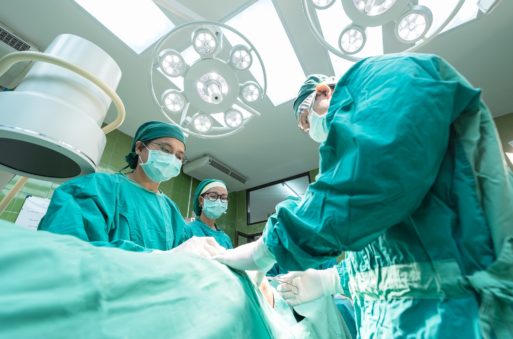
New technology may someday restore circulation in human organs for transplant, allowing for more time to get them from donor to recipient.
Researchers are hopeful that a new device may help to maintain viability of organs for transplant after a donor dies. A team at Yale School of Medicine conducted experiments on pigs undergoing cardiac arrest with a device called OrganEx. The machine takes over the function of the heart and lungs much like the machines used during surgery, while also promoting cellular recovery in isolated organs. Their experimentation on pigs successfully reestablished organ circulation an hour following the animal’s death, ultimately increasing their viability for transplantation.

Pig kidneys after 3 hours of perfusion with a conventional heart-lung perfusion machine (top) and OrganEx (bottom). The black shows where fluid has reached.
Courtesy: Nature Journal
Details of this study, funded by the National Institutes of Health and published in the journal Nature, outline the process used to rejuvenate cellular function. OrganEx pumps a mix of the pig’s blood and a fluid called a perfusate to maintain circulation throughout the body. This fluid is a combination of synthetic protein and oxygen used to prevent blood clots and promote cellular recovery. Perfusion was maintained for six hours, and was shown to preserve tissue integrity and some organ function in the brain, heart, liver and kidneys.
Although the research is still in its very early stages, experts are hopeful that this revolutionary technology could extend the window of plausibility of organs for transplant. At this time, most organs must be transplanted within four to 48 hours after being removed from the donor.
There are currently more than 100,000 men, women, and children on the national transplant waiting list. Seventeen people die each day waiting for a transplant.
Stephen Latham, director of the Yale Interdisciplinary Center for Bioethics, recently told CNN: “I think the technology has a great deal of promise for our ability to preserve organs after they’re removed from a donor. You could take the organ from a deceased donor, and hook it up to the perfusion technology, and perhaps then be able to transport it long distance over a long period of time to get it to a recipient who needs it.”
Organs for transplant are typically harvested from designated donors who are legally declared brain dead. Ethical concerns have been raised, as the machine carries the potential to restore brain function, much like any other organ. Stephen Latham, director of the Yale Interdisciplinary Center for Bioethics shared his thoughts on the matter with YaleNews: “There are numerous potential applications of this exciting new technology. However, we need to maintain careful oversight of all future studies, particularly any that include perfusion of the brain.”

 Revolutionary Technology Aims to Preserve Organs for Transplant
Revolutionary Technology Aims to Preserve Organs for Transplant


 How Dare You Die Now!
How Dare You Die Now!
 Debating Medical Aid in Dying
Debating Medical Aid in Dying
 “Help Me, Helen”
“Help Me, Helen”














